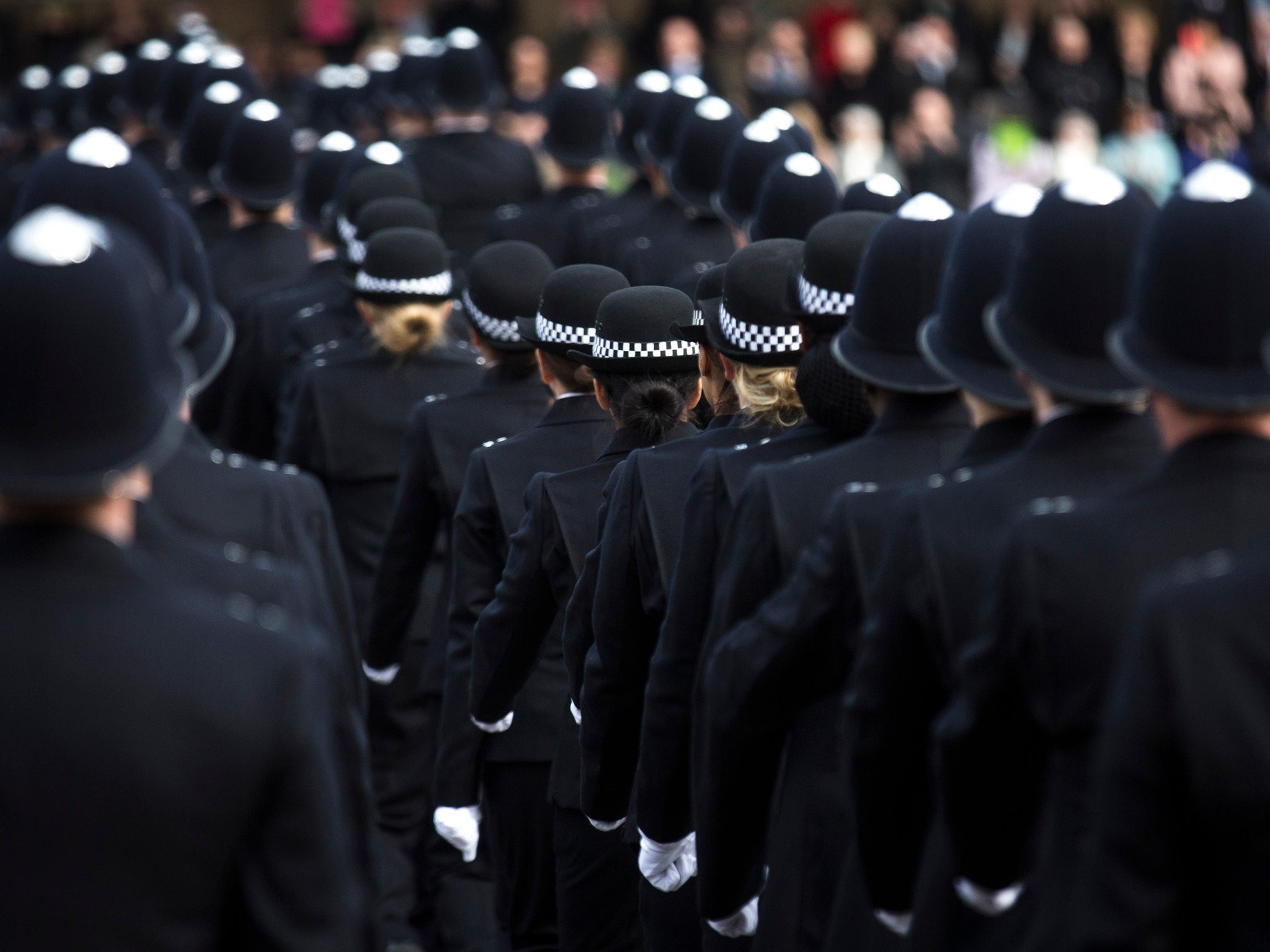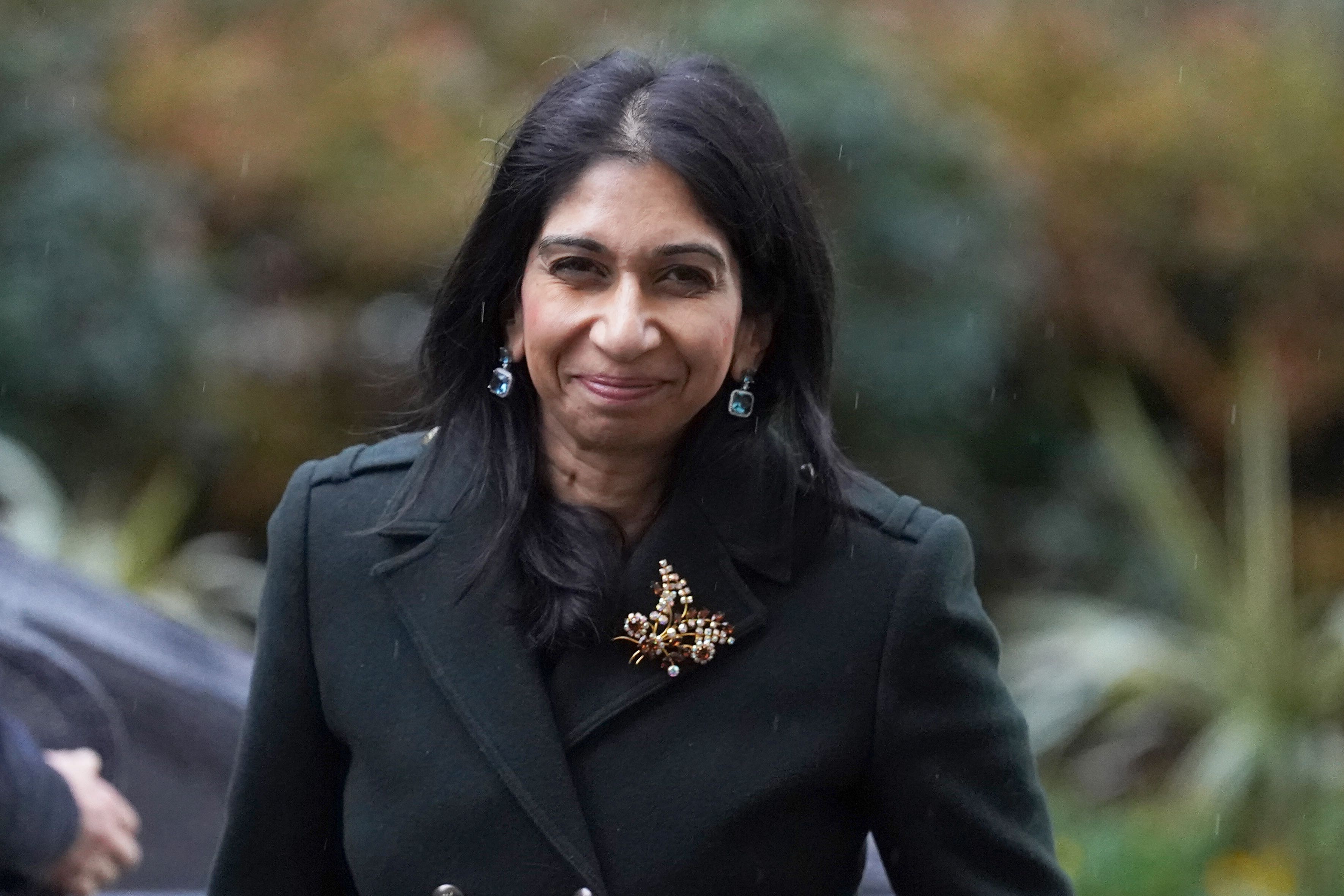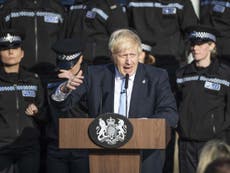Future of UK policing under threat unless officers given ‘fair’ pay increase, government told
Exclusive: Official submissions to pay board warn of rising resignations and frustration as police barred from striking

The future of British policing will be under threat if the government continues to ignore calls for a “fair” pay increase, it has been warned.
Submissions to the official advisory board on police pay say that the benefits of Boris Johnson’s pledge to recruit 20,000 extra officers will be lost if members of the force, who are legally barred from striking, continue to resign at rocketing rates.
Documents seen by The Independent state that police officers’ pay has fallen by almost 17 per cent since 2010, with starting salaries plummeting from more than £33,000 to between £23,500 and £26,700 when adjusted for inflation.
An official submission from the National Police Chiefs’ Council and other associations warned that a third of officers currently have less than five years’ experience, while a rising number are leaving for the private sector.
Leaders acknowledged that the police are “not alone” among public services demanding better pay, but argued that they face a “unique combination” of physical and mental risks along with restrictions on their personal lives for the purpose of upholding professional standards.
“The clear and present risks of an unfunded pay award are cuts to police staff and delays to recruitment,” the submission added. “The cumulative impact of this will be a reduction in the totality of policing and less support for officers, which undermines attraction and retention and makes their job more difficult.”
It called for the Police Remuneration Review Body (PRRB) to recommend that the home secretary introduce a “pay premium” across all ranks, warning that without it, police may not be able to deliver the government’s Beating Crime plan.
Figures for the year to March 2022 showed a huge jump in resignations, with almost 3,500 officers leaving by that route compared with fewer than 2,000 the year before. A Home Office report said that in the previous decade, the majority of police officers left via normal retirement, but there has now been a “noticeable change” as more leave voluntarily partway through their service.
The fresh warning comes after recorded crime in England and Wales hit an all-time high while the proportion charged remained at a record low. A third of all investigations end with no suspect identified, and a quarter of cases remain open after a year, while many more end because of “evidential difficulties”.
At the same time, the Metropolitan Police and other forces remain embroiled in a wave of scandals that have eroded public trust.
The Police Superintendents’ Association (PSA) said the future was “bleak”, with plummeting morale worsening dissatisfaction over pay.
“Our association has serious concerns about the future of UK policing,” said its president, Paul Fotheringham. “With no fair process to decide their pay, no right to withhold labour, and horrific stories of misconduct being shared, it is no surprise that our members are painting the worst picture of life as a police officer that we have recorded to date.”
He said that he feared experienced officers could “leave in droves because they cannot afford to stay”, while the Police Federation’s survey of rank-and-file officers recently showed that a fifth wanted to leave. The PSA’s own survey found that only 1 per cent of members thought that the current process of deciding pay through the PRRB was fair, and almost 90 per cent reported low morale in their force.
“The process in place to determine police officer pay is entirely unfair and delivers no procedural justice for a workforce of more than 140,000 public servants,” Mr Fotheringham said. “Those who chair and sit on the pay review body are selected by the prime minister and home secretary, and the home secretary dictates what the PRRB can consider – this makes it entirely political, with no independence.
“This paints a picture of complete disregard for police officers, and of a system that has never been intended to offer independence or fairness.”

The Home Office said the PRRB offered “independent and expert advice”, and was staffed with experts chosen in accordance with the government’s code for public appointments. It said officers already receive incremental pay increases, as well as overtime and other allowances on top of their salary, and that the government’s own survey of new recruits showed that more than three-quarters are satisfied and “intend to continue as police officers for the rest of their working lives”.
A spokesperson added: “We are recruiting 20,000 additional officers, which presents a unique opportunity to change the face of policing and help rebuild public trust in the profession. The overwhelming majority of new recruits recently surveyed report positive job satisfaction and want to remain officers for the rest of their working lives.
“We recognise the increased pressures with the cost of living, which is why we accepted the PRRB’s recommendation to award a consolidated increase of £1,900 to all ranks of police officers.”





Join our commenting forum
Join thought-provoking conversations, follow other Independent readers and see their replies
Comments